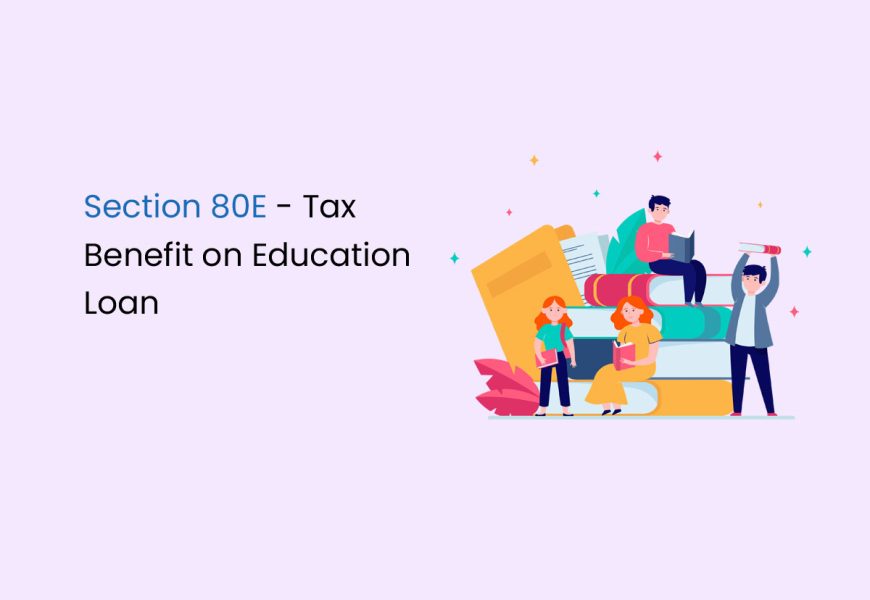Section 80E of the Income Tax Act plays a pivotal role in supporting individuals pursuing higher education through education loans. The section is focused on easing the financial burden associated with education, providing tax incentives specifically for the interest paid on such loans, spanning a maximum of eight years. Understanding the nuances of Section 80E becomes essential for those navigating the complexities of financing their educational endeavours.
Section 80E: Education Loan Deduction
Section 80E provides a tax incentive for individuals pursuing higher studies through education loans. This deduction applies only to the interest paid on the loan, not the principal amount. The benefit extends for a maximum of eight years, starting from the year of interest repayment commencement. This provision aims to alleviate the financial strain associated with education, offering support to those investing in their educational journey.
Eligibility for Education Loan Deduction (Section 80E)
Individuals, including parents and legal guardians, can claim the education loan deduction under Section 80E. This benefit is exclusive to individuals and does not apply to HUF or other taxpayer categories. The loan must be obtained for higher education, covering the taxpayer, their spouse, children, or a student for whom they are a legal guardian. This provision acknowledges the financial commitment to education and encourages support for academic pursuits.
Approved Lenders for Education Loan Deduction
To avail of the education loan deduction under Section 80E, obtaining the loan from recognised sources is essential. Eligible lenders include banks, financial institutions, or approved charitable organisations. While supportive, loans acquired from friends or relatives do not qualify for this specific deduction. Ensuring the loan’s legitimacy from approved entities ensures compliance with the tax regulations for claiming deductions.
Purpose for Education Loan Deduction
To be eligible for the education loan deduction under Section 80E, the loan must be specifically utilised for pursuing higher studies. Whether the higher studies are pursued within India or abroad is inconsequential for the deduction’s eligibility. Higher studies, in this context, encompass a broad range of fields and courses undertaken after completing the senior secondary examination or its equivalent. This includes vocational and regular courses, ensuring a comprehensive scope for claiming the deduction.
Section 80E Tax Exemption Limits
Under Section 80E, the deduction applies to the interest component of an education loan, similar to Sections 80C and 80D deductions. Notably, there is no predefined limit for Section 80E exemption. The deduction allows you to subtract the entire interest amount paid on the loan from your total income when calculating taxable income. This implies that you can claim the deduction for the full interest amount paid in a financial year, regardless of the actual figure.
For example, if your gross taxable income, post other deductions, amounts to Rs 6.7 lakh, and you repay Rs. 2,00,000 as the interest component of the education loan, your taxable income for calculation purposes would be reduced to Rs 4.7 lakh, leading to tax calculations accordingly.
Deduction Under Section 80E
Under Section 80E, the deduction is granted for the entire interest portion of the Equated Monthly Installment (EMI) paid during the financial year. There is no maximum limit on the amount of deduction that can be claimed. However, you must obtain a certificate from your bank to avail of this benefit. This certificate should clearly distinguish between the principal and interest components of the education loan payments made in the respective financial year. The deduction applies only to the total interest paid, and no tax benefit is provided for the principal repayment.
Period of Deduction for Education Loan under Section 80E
The deduction for interest on an education loan commences from the year in which the repayment begins. This deduction is applicable for a maximum of 8 years, starting from the year of the first repayment or until the interest is fully repaid, whichever occurs earlier. If the complete repayment is achieved in less than 8 years, the tax deduction will be allowed only for the actual number of years of repayment. However, if the loan tenure surpasses 8 years, no deduction can be claimed for interest paid beyond this period. Therefore, settling education loans within the stipulated 8-year timeframe is advisable.
Deduction Amount under Section 80E
Under Section 80E of the Income Tax Act of 1961, individuals can claim deductions exclusively on the interest component of the education loan for higher studies. It’s important to note that no tax exemptions apply to the principal amount of the loan.
Key points regarding the deduction amount:
- Interest Component Only: Deductions apply solely to the interest paid on the loan for higher education. The principal amount is not eligible for any tax exemptions.
- Yearly Basis: Deductions can be claimed only in the years when interest payments are made on the loan.
- No Maximum Limit: Unlike some other sections, there is no specified maximum limit for the deduction amount, providing flexibility to claim the actual interest paid.
Essential Documents for Section 80E Tax Deduction
To claim tax deductions under Section 80E, individuals need the following documents:
Loan Certificate: Obtain a certificate from the financial institution or charitable institute providing the education loan. This certificate should detail the bifurcation of the principal and interest amounts for the respective financial year.
Eligibility for Section 80E Deduction on Education Loan
To be eligible for deduction under Section 80E on an education loan:
- Only the interest component of the educational loan is claimable as a deduction.
- The deduction is exclusive to individuals; Hindu Undivided Families (HUFs) and companies are not eligible for the 80E deduction.
- The education loan must be obtained from recognised financial institutions or charitable organisations, and loans from friends or relatives do not qualify.
- The loan must be availed for higher education, applicable to the taxpayer, their spouse, or children.
- The deduction can be claimed for a maximum of 8 consecutive years from the year of commencement of loan repayment.
Tax Benefits of Section 80E
Individuals benefiting from an education loan for higher studies can leverage various tax advantages under the provisions of the Income Tax Act. Notably:
- No Ceiling on Deductions: If taxpayers have already claimed the maximum deductions under Section 80C (Rs. 1,50,000), they remain eligible for additional deductions under Section 80E. There is no upper limit specified for these deductions.
- Exclusive for Education Loan: Section 80E is specifically designed for the interest paid on education loans, allowing individuals to maximise their tax benefits beyond the limits of other sections.
Repaying Education Loan Early
Many borrowers opt for the full 8-year repayment period, choosing to invest their surplus funds instead of settling the loan early. This approach is strategic, leveraging the available tax benefits for education loans. It proves effective for those confident in earning higher returns through investments than the loan interest rate.
Consider this approach if you possess the expertise to generate superior returns through investments. However, repaying the loan early is advisable if your priority is debt-free financial standing and a robust loan repayment record. This enhances your financial credibility and improves prospects for securing larger loans, such as a home loan.
In Conclusion
Section 80E stands as a valuable resource for those committed to advancing their education through financial means. Offering deductions on the interest component of education loans serves as a catalyst for individuals seeking academic growth. Understanding the eligibility criteria, associated benefits, and repayment considerations empowers taxpayers to make informed financial decisions, fostering a harmonious balance between educational aspirations and fiscal responsibilities.
Frequently Asked Questions
Is there a limit on the maximum amount I can claim as a deduction under Section 80E?
No, there is no specified limit on the maximum amount allowed as a deduction under Section 80E.
Can I avail of a Section 80E deduction for an education loan taken for my child studying abroad?
Yes, you can claim a deduction under Section 80E even if your child is pursuing higher education abroad, including both vocational and regular courses.
Is Section 80E a part of Section 80C?
No, Section 80E is distinct from Section 80C. While Section 80C provides a deduction for tuition fees, Section 80E specifically pertains to the interest paid on educational loans for higher studies.





















